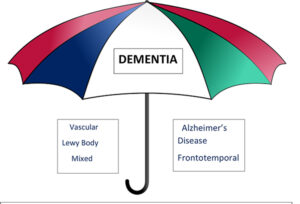By Shawna Wasko
 The most common question I am asked by caregivers is, “What is the difference between dementia and Alzheimer’s disease.”
The most common question I am asked by caregivers is, “What is the difference between dementia and Alzheimer’s disease.”
Last December I worked on a document that answers this question. Dementia is basically a group of conditions that impact memory, thinking, and social skills. Essentially, the document shows that the umbrella term is dementia, and several forms of dementia fit under the umbrella of dementia.
Many people will tell me that their spouse or mom or sister has been diagnosed with dementia. I will ask them what kind of dementia and they say to me, most of the time, “Just dementia.” I frequently will explain to them that there are several types of dementia, and the most common dementia is Alzheimer’s disease. I explain that it is estimated that Alzheimer’s disease accounts for up to 80% of dementia.
This often frightens people, but I tell them knowledge is their best weapon in dealing with dementia. When we know what to expect, we can cope better with the situation and prepare better to deal with the condition their loved one has. This knowledge can help explain behaviors your loved one may exhibit.
In my Office on Aging caregiver support group, I will give out this document and talk with my caregivers about the different types of dementia (for more information on the support group, please call the Office on Aging: 208.736.2122). Please review the document and see which one of the dementias fit with what your loved one is going through.
Shawna Wasko Group Facilitator
CSI Office on Aging
swasko@csi.edu
Dementia: is a group of conditions that impact memory, thinking, and social skills. Dementia is often used as an “umbrella” term for different types of dementia. See explanation of different types below:
Alzheimer’s Disease (AD): is an irreversible, progressive brain disorder that slowly destroys memory and thinking skills. Brain develops many abnormal clumps (amyloid plaques) and tangled bundles of fibers (tau tangles). Most common dementia, accounting for up to 80% of dementia.
Frontotemporal Dementia (FD): uncommon type of dementia that causes problems with behavior and language. FD affects the frontal and temporal lobes of the brain. Some people with FD have dramatic changes in their personality and become socially inappropriate, impulsive, or emotionally indifferent.
Lewy Body Dementia (LBD): is a degenerative condition with many similarities to Alzheimer’s Disease but includes ambulatory changes that are common with Parkinson’s Disease (tremors, shaking).
Mixed Dementia: is a condition where changes representing more than one type of dementia occur simultaneously in the brain. Brain forms plaques consistent with AD along with blood vessel changes like Vascular Dementia.
Vascular Dementia: describes problems with reasoning, planning, judgment, memory, and other thought processes caused by impaired blood flow to your brain (stroke). With each stroke the person losses more abilities, often referred to as a stair step loss of abilities.



